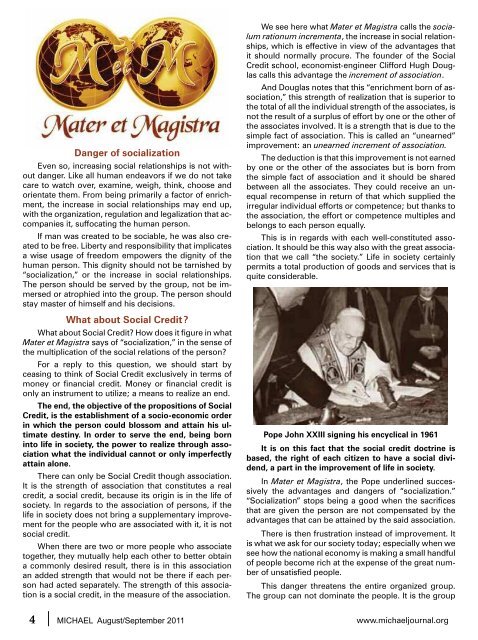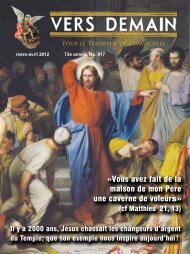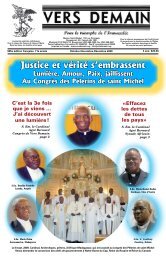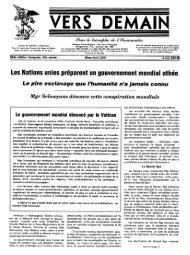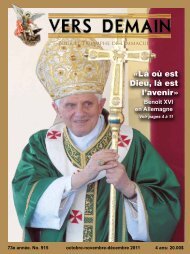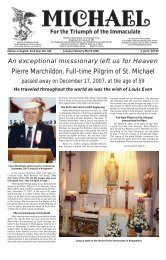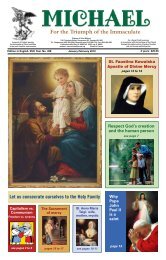For the Triumph of the Immaculate
For the Triumph of the Immaculate
For the Triumph of the Immaculate
Create successful ePaper yourself
Turn your PDF publications into a flip-book with our unique Google optimized e-Paper software.
Danger <strong>of</strong> socialization<br />
Even so, increasing social relationships is not without<br />
danger. Like all human endeavors if we do not take<br />
care to watch over, examine, weigh, think, choose and<br />
orientate <strong>the</strong>m. From being primarily a factor <strong>of</strong> enrichment,<br />
<strong>the</strong> increase in social relationships may end up,<br />
with <strong>the</strong> organization, regulation and legalization that accompanies<br />
it, suffocating <strong>the</strong> human person.<br />
If man was created to be sociable, he was also created<br />
to be free. Liberty and responsibility that implicates<br />
a wise usage <strong>of</strong> freedom empowers <strong>the</strong> dignity <strong>of</strong> <strong>the</strong><br />
human person. This dignity should not be tarnished by<br />
“socialization,” or <strong>the</strong> increase in social relationships.<br />
The person should be served by <strong>the</strong> group, not be immersed<br />
or atrophied into <strong>the</strong> group. The person should<br />
stay master <strong>of</strong> himself and his decisions.<br />
What about Social Credit?<br />
What about Social Credit? How does it figure in what<br />
Mater et Magistra says <strong>of</strong> “socialization,” in <strong>the</strong> sense <strong>of</strong><br />
<strong>the</strong> multiplication <strong>of</strong> <strong>the</strong> social relations <strong>of</strong> <strong>the</strong> person?<br />
<strong>For</strong> a reply to this question, we should start by<br />
ceasing to think <strong>of</strong> Social Credit exclusively in terms <strong>of</strong><br />
money or financial credit. Money or financial credit is<br />
only an instrument to utilize; a means to realize an end.<br />
The end, <strong>the</strong> objective <strong>of</strong> <strong>the</strong> propositions <strong>of</strong> Social<br />
Credit, is <strong>the</strong> establishment <strong>of</strong> a socio-economic order<br />
in which <strong>the</strong> person could blossom and attain his ultimate<br />
destiny. In order to serve <strong>the</strong> end, being born<br />
into life in society, <strong>the</strong> power to realize through association<br />
what <strong>the</strong> individual cannot or only imperfectly<br />
attain alone.<br />
There can only be Social Credit though association.<br />
It is <strong>the</strong> strength <strong>of</strong> association that constitutes a real<br />
credit, a social credit, because its origin is in <strong>the</strong> life <strong>of</strong><br />
society. In regards to <strong>the</strong> association <strong>of</strong> persons, if <strong>the</strong><br />
life in society does not bring a supplementary improvement<br />
for <strong>the</strong> people who are associated with it, it is not<br />
social credit.<br />
When <strong>the</strong>re are two or more people who associate<br />
toge<strong>the</strong>r, <strong>the</strong>y mutually help each o<strong>the</strong>r to better obtain<br />
a commonly desired result, <strong>the</strong>re is in this association<br />
an added strength that would not be <strong>the</strong>re if each person<br />
had acted separately. The strength <strong>of</strong> this association<br />
is a social credit, in <strong>the</strong> measure <strong>of</strong> <strong>the</strong> association.<br />
We see here what Mater et Magistra calls <strong>the</strong> socialum<br />
rationum incrementa, <strong>the</strong> increase in social relationships,<br />
which is effective in view <strong>of</strong> <strong>the</strong> advantages that<br />
it should normally procure. The founder <strong>of</strong> <strong>the</strong> Social<br />
Credit school, economist-engineer Clifford Hugh Douglas<br />
calls this advantage <strong>the</strong> increment <strong>of</strong> association.<br />
And Douglas notes that this “enrichment born <strong>of</strong> association,”<br />
this strength <strong>of</strong> realization that is superior to<br />
<strong>the</strong> total <strong>of</strong> all <strong>the</strong> individual strength <strong>of</strong> <strong>the</strong> associates, is<br />
not <strong>the</strong> result <strong>of</strong> a surplus <strong>of</strong> effort by one or <strong>the</strong> o<strong>the</strong>r <strong>of</strong><br />
<strong>the</strong> associates involved. It is a strength that is due to <strong>the</strong><br />
simple fact <strong>of</strong> association. This is called an “unearned”<br />
improvement: an unearned increment <strong>of</strong> association.<br />
The deduction is that this improvement is not earned<br />
by one or <strong>the</strong> o<strong>the</strong>r <strong>of</strong> <strong>the</strong> associates but is born from<br />
<strong>the</strong> simple fact <strong>of</strong> association and it should be shared<br />
between all <strong>the</strong> associates. They could receive an unequal<br />
recompense in return <strong>of</strong> that which supplied <strong>the</strong><br />
irregular individual efforts or competence; but thanks to<br />
<strong>the</strong> association, <strong>the</strong> effort or competence multiples and<br />
belongs to each person equally.<br />
This is in regards with each well-constituted association.<br />
It should be this way also with <strong>the</strong> great association<br />
that we call “<strong>the</strong> society.” Life in society certainly<br />
permits a total production <strong>of</strong> goods and services that is<br />
quite considerable.<br />
Pope John XXIII signing his encyclical in 1961<br />
It is on this fact that <strong>the</strong> social credit doctrine is<br />
based, <strong>the</strong> right <strong>of</strong> each citizen to have a social dividend,<br />
a part in <strong>the</strong> improvement <strong>of</strong> life in society.<br />
In Mater et Magistra, <strong>the</strong> Pope underlined successively<br />
<strong>the</strong> advantages and dangers <strong>of</strong> “socialization.”<br />
“Socialization” stops being a good when <strong>the</strong> sacrifices<br />
that are given <strong>the</strong> person are not compensated by <strong>the</strong><br />
advantages that can be attained by <strong>the</strong> said association.<br />
There is <strong>the</strong>n frustration instead <strong>of</strong> improvement. It<br />
is what we ask for our society today; especially when we<br />
see how <strong>the</strong> national economy is making a small handful<br />
<strong>of</strong> people become rich at <strong>the</strong> expense <strong>of</strong> <strong>the</strong> great number<br />
<strong>of</strong> unsatisfied people.<br />
This danger threatens <strong>the</strong> entire organized group.<br />
The group can not dominate <strong>the</strong> people. It is <strong>the</strong> group<br />
that exists for each person and not <strong>the</strong> person for <strong>the</strong><br />
group.<br />
In <strong>the</strong>ir Message for <strong>the</strong> Celebration <strong>of</strong> Labour Day<br />
1962 on “socialization,” <strong>the</strong> Bishops <strong>of</strong> Canada wrote:<br />
“The organization is made to serve man, and not man<br />
to serve <strong>the</strong> organization.”<br />
Douglas expressed this same principle multiple<br />
times. In <strong>the</strong> first chapter <strong>of</strong> his first work Economic Democracy,<br />
he wrote: “Systems were made for men, and<br />
not men for systems, and <strong>the</strong> interest <strong>of</strong> man which is<br />
self-development, is above all systems.”<br />
Like Mater et Magistra<br />
It was 44 years before <strong>the</strong> encyclical Mater et Magistra<br />
written by John XXIII that Douglas conceived and<br />
presented <strong>the</strong> concrete propositions (in 1917) for which,<br />
at <strong>the</strong> level <strong>of</strong> <strong>the</strong> nation, <strong>the</strong> person should be enriched<br />
by association instead <strong>of</strong> being suffocated by it.<br />
Mater et Magistra wishes <strong>the</strong> quick development <strong>of</strong><br />
economic structures to contribute, not to concentrate<br />
<strong>the</strong> riches and <strong>the</strong> property in <strong>the</strong> hands <strong>of</strong> a few, (even<br />
less in <strong>the</strong> hands <strong>of</strong> a totalitarian State) but to diffuse as<br />
much as possible <strong>the</strong> idea <strong>of</strong> private property: “Durable<br />
consumer goods,” wrote <strong>the</strong> Pope, “houses, land, tools<br />
and equipment (in <strong>the</strong> case <strong>of</strong> craftsmen and owners<br />
<strong>of</strong> family farms), and shares in medium and large business<br />
concerns.” (n. 115)<br />
Since <strong>the</strong> year 1917, Douglas <strong>of</strong>fered a genial formula<br />
that would give to each person <strong>the</strong> recognition due<br />
to him; a part <strong>of</strong> a real national credit. Each citizen would<br />
receive at his birth a social share, inalienable, non-transferable<br />
and capable <strong>of</strong> providing at least <strong>the</strong> essential<br />
necessities <strong>of</strong> life. And as <strong>the</strong> flow <strong>of</strong> production results<br />
in a larger part from progress and less from <strong>the</strong> effort<br />
from <strong>the</strong> producer, <strong>the</strong> distribution <strong>of</strong> purchasing power<br />
is being done more through dividends and less through<br />
salaries.<br />
A capitalism thus corrected, causing revenue linked<br />
to <strong>the</strong> person to grow, that is not connected to his work,<br />
will leave no one in poverty or in <strong>the</strong> humiliation <strong>of</strong> being<br />
helped by <strong>the</strong> State or at <strong>the</strong> expense <strong>of</strong> o<strong>the</strong>rs.<br />
Production will be motivated by <strong>the</strong> efficient demand<br />
<strong>of</strong> consumers provided with purchasing power. With<br />
<strong>the</strong> rapid disappearance <strong>of</strong> <strong>the</strong> waste <strong>of</strong> natural resources,<br />
time and human activities — waste that is due to<br />
crazy regulations that forces employment in indifferent<br />
production in order to have a right to an income, a production<br />
that can <strong>of</strong>ten be useless or harmful.<br />
You have to have really badly understood <strong>the</strong> encyclical<br />
Mater et Magistra written by John XXIII to see<br />
even a small approbation <strong>of</strong> socialism. It is more likely<br />
<strong>the</strong> Social Credit school that will be comfortable, even<br />
very comfortable, reading what John XXIII wrote about<br />
“socialization,” about private property, <strong>the</strong> function <strong>of</strong><br />
<strong>the</strong> State, <strong>the</strong> rights <strong>of</strong> <strong>the</strong> person and <strong>the</strong> conditions<br />
needed to establish and protect <strong>the</strong> liberty and dignity<br />
<strong>of</strong> man.<br />
Louis Even<br />
Benedict XVI and Mater et Magistra<br />
(Vatican Information Service) — On May 16,<br />
2011, Benedict XVI received <strong>the</strong> participants in <strong>the</strong><br />
World Conference promoted by <strong>the</strong> Pontifical Council<br />
“Justice and Peace” on <strong>the</strong> 50th anniversary <strong>of</strong><br />
Blessed John XXIII’s Encyclical Mater et Magistra.<br />
In his discourse, <strong>the</strong> Pope stressed that “truth,<br />
love, justice, indicated by Mater et Magistra, along<br />
with <strong>the</strong> principal <strong>of</strong> <strong>the</strong> universal destination <strong>of</strong><br />
goods, as fundamental criteria for overcoming social<br />
and cultural imbalances, remain <strong>the</strong> pillars for<br />
interpreting and resolving <strong>the</strong> imbalances caused<br />
by today’s globalisation. In <strong>the</strong> face <strong>of</strong> such imbalances<br />
<strong>the</strong>re is a need to re-establish a ‘whole reason’<br />
able to give rise to a rebirth <strong>of</strong> thought and<br />
ethics. ... It is necessary to<br />
develop ‘humanistic cultural<br />
syn<strong>the</strong>ses’ open to transcendence<br />
through a ‘new<br />
evangelisation.’”<br />
“The various examples<br />
<strong>of</strong> imbalance worldwide,<br />
characteristic <strong>of</strong> this age,<br />
feed o<strong>the</strong>r ills such as disparity,<br />
differences in wealth, inequality,<br />
which create problems<br />
in terms <strong>of</strong> justice and<br />
<strong>the</strong> equitable distribution <strong>of</strong><br />
resources and opportunities,<br />
especially in relation to <strong>the</strong><br />
world’s poorest.”<br />
The Pope remarked that “no less worrying<br />
are <strong>the</strong> phenomena linked to <strong>the</strong> financial system<br />
which, after <strong>the</strong> most acute phase <strong>of</strong> <strong>the</strong> recent<br />
crisis, has returned to <strong>the</strong> frenzied issue <strong>of</strong> credit<br />
contracts which frequently give rise to limitless<br />
speculation... similarly, <strong>the</strong> increase in price <strong>of</strong><br />
primary energy resources... have negative consequences<br />
on <strong>the</strong> environment as well as on humans.”<br />
“The current social question,” he added, “is<br />
without doubt that <strong>of</strong> world social justice... <strong>the</strong><br />
equitable distribution <strong>of</strong> material and non-material<br />
resources, and <strong>the</strong> globalisation <strong>of</strong> substantial, social<br />
and participatory democracy.” This justice, he<br />
continued, “cannot be achieved solely on <strong>the</strong> basis<br />
<strong>of</strong> mere social consensus, without recognising that<br />
this, in order to be long-lasting, must be rooted in<br />
universal human good.”<br />
Referring to <strong>the</strong> diffusion <strong>of</strong> <strong>the</strong> Social Doctrine<br />
<strong>of</strong> <strong>the</strong> Church, <strong>the</strong> Pope concluded by recalling that<br />
“<strong>the</strong>re exist important institutions at <strong>the</strong> service <strong>of</strong><br />
<strong>the</strong> new evangelisation, such as voluntary associations,<br />
Christian or Christian-inspired non-governmental<br />
organisations, <strong>the</strong> Commission Justice and<br />
Peace, <strong>the</strong> <strong>of</strong>fices for social and work problems and<br />
<strong>the</strong> Centres and Institutes for Social Doctrine.”<br />
4 MICHAEL August/September 2011 www.michaeljournal.org www.michaeljournal.org<br />
MICHAEL August/September 2011 5


